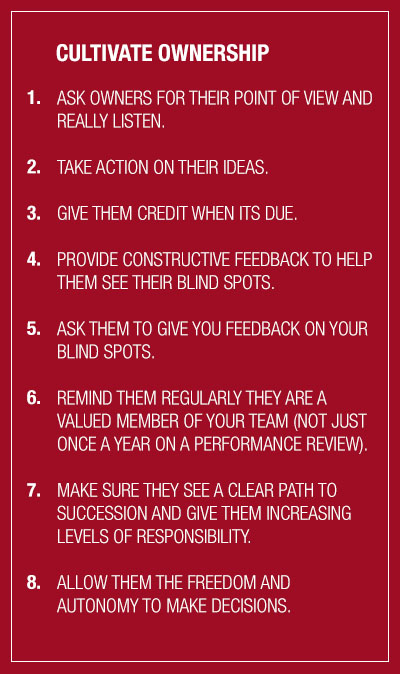
July 20, 2015
By Tami Rubino, BioSpace Hiring and Branding Guru
Is it possible to teach people to own their job?
First, it’s important to level set what it means to “own your job.” It’s not based on title or a pre-defined level of authority—it’s an immeasurable amount of initiative and accountability. Developing true employee ownership is a process in itself. Let me demonstrate.
Fifteen years ago, I was a young human resources director at a company that had been acquired and the new corporate parent decided to relocate operations to another state. The business transition was painfully slow with several rounds of downsizing that lasted for over a year. I had the difficult job of trying to prevent key employees from jumping ship too soon, while maintaining adequate levels of production staff to keep the business afloat.

In contrast, other employees started arriving late and leaving early. They blew off assignments or spent the whole day at their desk surfing the web; they were completely disengaged. Most of the staff was tenured and the stress of their impending unemployment was almost unbearable. However, the ownership quality is uncompromising. You either have it or you don’t, and it shows up regardless of the circumstances you’re in.
These are the people that companies dream of hiring—team captains that never quit and never let you down. But don’t mistake ownership for self-sacrificing servitude—two mutually exclusive qualities. Owners know their limits and set appropriate boundaries so they don’t run themselves into the ground.
During the years after the Affordable Care Act passed, I was an executive in the health insurance industry, which was undergoing a radically disruptive change. The months leading up to the launch of the online Exchanges were particularly onerous. Unfortunately, “command and control” was the default for many leaders on our team. We got really good at putting project plans together, barking out orders to staff and spending countless hours in unproductive meetings, but we ultimately struggled to accomplish our goals on time and on budget. The long term cost to the organizational culture and the personal sacrifices of the team were insurmountable.
So don’t confuse “command and control” with ownership. Owners are the exact opposite:
1. Collaborative and altruistic.
2. Curious about other people’s perspectives.
3. Like to win, but not at the cost of their values or their teammates.
4. Bring solutions to the table, not complaints.
5. Never utter the words, “That’s not my job."
6. Do their absolute best even when no one is looking.
7. Don’t tell people what to do, they just get things done.
Keep in mind, leading people with the ownership quality is no walk in the park. They will challenge you, push the envelope and you may even suspect they’re gunning for your job—so be sure to check your personal insecurities at the door. If you own your job, you have no reason to feel threatened. Embrace your owners— in fact, surround yourself with them. Success with a team full of owners is almost guaranteed!
So while it may be impossible to teach this innate skill, as a leader, it is critical to cultivate it:
1. Ask owners for their point of view and really listen.
2. Take action on their ideas.
3. Give them credit when its due.
4. Provide constructive feedback to help them see their blind spots.
5. Ask them to give you feedback on your blind spots.
6. Remind them regularly they are a valued member of your team (not just once a year on a performance review).
7. Make sure they see a clear path to succession and give them increasing levels of responsibility.
8. Allow them the freedom and autonomy to make decisions.
So what about you? Do you think ownership is teachable? Can you identify the owners on your team? Are you modeling ownership skills that can be emulated by your peers? Ponder those tough questions. I’d love to hear your thoughts.
Check out the latest Inside Recruiter eNewsletter - July 20, 2015.
Sign up for the free Inside Recruiter eNewsletter.




